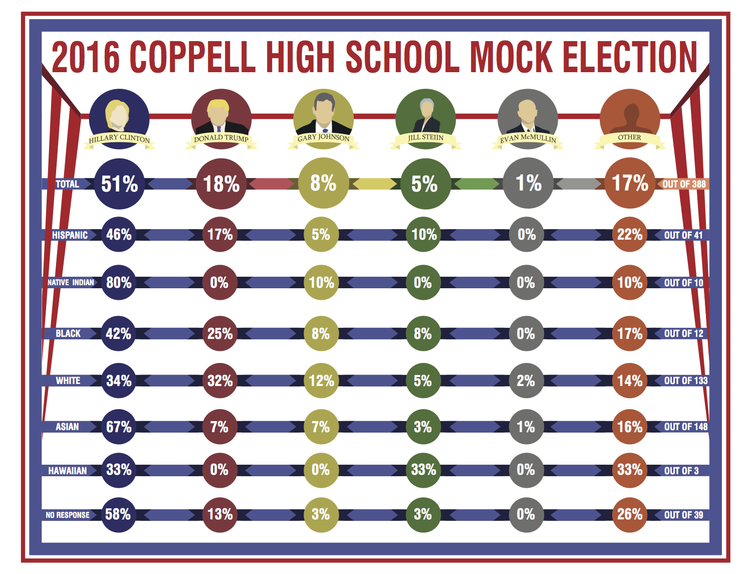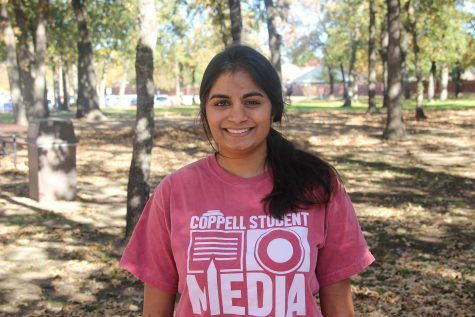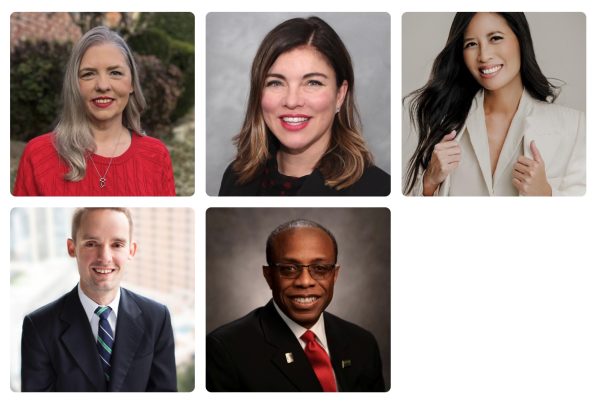CHS senior minorities react to 2016 election season

Throughout the 2016 election season, Democratic nominee Hillary Clinton and Republican nominee Donald Trump have utilized minority status to the advantage of their individual campaigns.
The two candidates have grappled for the minority vote since the beginning of the election cycle.
For Trump, this manifests itself in the form of divisive rhetoric that some have deemed “fear-mongering”. In early June, when Trump’s “great wall” along the U.S.-Mexican border took shape as the cornerstone of his campaign he referred to Mexican immigrants as “rapists”, a statement that has been used against him time and time again by his opponent.
Trump has also made references to “the blacks” and their generally dilapidated state of living throughout his campaign and referred to a black Trump supporter as “my African American”.
“It makes me mad,” CHS senior Alexandria-Elizabeth Eason said. “Just because I’m a minority doesn’t mean that I’m not a person. To me, I get angry because the way that he refers to African Americans. In the last debate, he talked about improving inner cities. Not all black people live in inner cities, he’s perpetuating a stereotype and I don’t know if I can have someone in office knowing that he doesn’t value me as both a woman and a minority.”
Beginning in December 2015, the reality star-turned-presidential candidate shook the loyalties of the Republican party when he announced his plan to ban Muslim immigration into the United States post-San Bernardino, Calif. shooting. Later in the election cycle, he cleared up that the ban would only be temporary until “ we figure this thing out”.
However, several Muslims have come forward since saying Trump’s rhetoric alone poses challenges to their community by validating the Islamophobic tendencies of many. At the Democratic National Convention, Gold Star father Khizr Khan offered Trump his copy of the U.S. Constitution. Trump subsequently attacked Khan’s wife for staying silent during her husband’s speech.
“[Trump’s rhetoric] has made me a lot more afraid of what’s going to happen on Nov. 8,” CHS senior Diversity Club president Naureen Wajahat said. “If Donald Trump actually gets elected, will my life change; will I have to leave the country; will I not be safe at home?
“I feel like a lot of people have their feelings validated by him. Because he’s saying these things, people feel like they can act on their feelings. It’s good that other politicians, not just Democrats, even his own vice presidential pick, are coming forward and saying that his statements are divisive.”
When Trump began his campaign, his stance on LGBT civil rights was similar to most other Republican politicians. Early in his campaign, he threatened to undo civil protections like the Obergefell v. Hodges ruling that made same-sex marriage legal.
However, Trump’s stance on the issue of gay marriage began to evolve after the Pulse nightclub shooting in Orlando.
“At his rallies, [Trump] is starting to bring up how he supports the gays and the gays love him,” said a gay CHS senior, who wished to remain anonymous. “It’s kind of upsetting that he’s so wishy-washy. Make it clear if you’re going to be for or against us because we’ve been struggling for so long.
“I also hate how Trump is making it look like he wants to protect the sanctity of marriage when he gets divorced so often.”
However while many minority groups fear a Trump presidency and are throwing their support towards Clinton, some CHS seniors question her history and likeability.
“Hillary Clinton hasn’t been the most likable compared to Barack Obama,” Wajahat said. “But when you compare her to Trump it’s like a different playing field. People shut her out because they think she represents the corrupt nature of politics.”
Senior Jia Lou has a hard time aligning herself with Clinton.
“I guess you could say I’m with her because I’m not with him,” Lou said. “When [Democratic candidate Bernie Sanders] dropped out of the race, I knew there was no way I could support Donald Trump. I guess it’s by default that I have to vote Hillary. You have to take everything career politicians say with a grain of salt, but she is infinitely more qualified than Trump.”
However, Lou’s position was strengthened when Trump’s sexual assault accusations came to light.
“In this election, I don’t think my status as a minority defines me as much as my status as a woman,” she said. “The fact that Trump has said these awful things about women is disgusting. And when he lies about the things he has said and done, it’s really problematic. At least Hillary has owned up to her mistakes. The thought of a Trump presidency is scary; he has accountability issues.”

Sakshi Venkatraman is a senior at Coppell High School. This is her second year as news editor and third year on staff. Sakshi enjoys writing creatively...












Venky Venkatraman • Nov 10, 2016 at 10:34 am
As an epitaph to my last comment, I would like to share a few more thoughts after Trump ended up winning the Presidential election.
It is my sense that all the polls were proved wrong because people were not willing to reveal their true intent to the pollsters.
Similarly, as a journalist, you appear to have spoken mainly with people who had a one-sided view on Trump vis-à-vis Clinton. If you had spread your net further and sympathetically interviewed people who had pro-Trump views to find out why exactly they were supporting him, it would have resulted in a more balanced article and you might have got an inkling that there was going to be a secret Trump vote that would upset all calculations.
To conclude, if you had taken that approach, your stock as a journalist would have gone through the roof as someone who thoroughly researches all aspects of an issue before putting pen to paper – and hence your articles are definitely worth reading for people who want to know the whole story rather than a slanted version.
Venky Venkatraman • Nov 4, 2016 at 9:00 am
When it comes to religion and politics, it is imperative that a journalist choose her words carefully. These are topics where people have strong views and so it is critical to separate facts from opinions.
Let’s start with “Hillary Clinton and Republican nominee Donald Trump have utilized minority status to the advantage of their individual campaigns” – what exactly does this mean since neither of them is a “minority” in any sense of the word in America.
Next the reference to Trump’s alleged reference to Mexican immigrants as “rapists”. He was talking about illegal immigrants coming across the border where many of the human smugglers (“coyotes”) are known to engage in rape. But this sound bite has been used again and again against Trump.
With respect to ” Not all black people live in inner cities” – but many of them do! I don’t recall Trump ever saying that all of them do.
Then there is Khizr Khan – clearly he did attack Trump at his speech at the DNC – that is his right – and similarly Trump has the right to attack him back – that is his right as well – why should a Gold Star father be treated as a “sacred cow”.
Coming to his policy on gays, may be they are “evolving” just like Obama who claimed when he was first running for President that marriage can only between a man and a woman and then flip flopped after becoming President. And getting divorced multiple times is still legal in America!
Finally, I agree that Trump is a crass individual and the way he talks about women and sex is a lot like what me of his generation in America used to do in the 80s and 90s. What was acceptable behavior then can be deemed sexual harassment by today’s standards – but that is still a far cry from “sexual assault” – by labeling it as such. it only trivializes the predicament of women who have actually been raped.
And the last straw – “Hillary has owned up to her mistakes. ” – really? If she did own up to everything has been alleged, then she could never become President!
To close, any article on religion and politics is bound to be controversial – but if you stick to facts, your opinions will have much greater credibility.